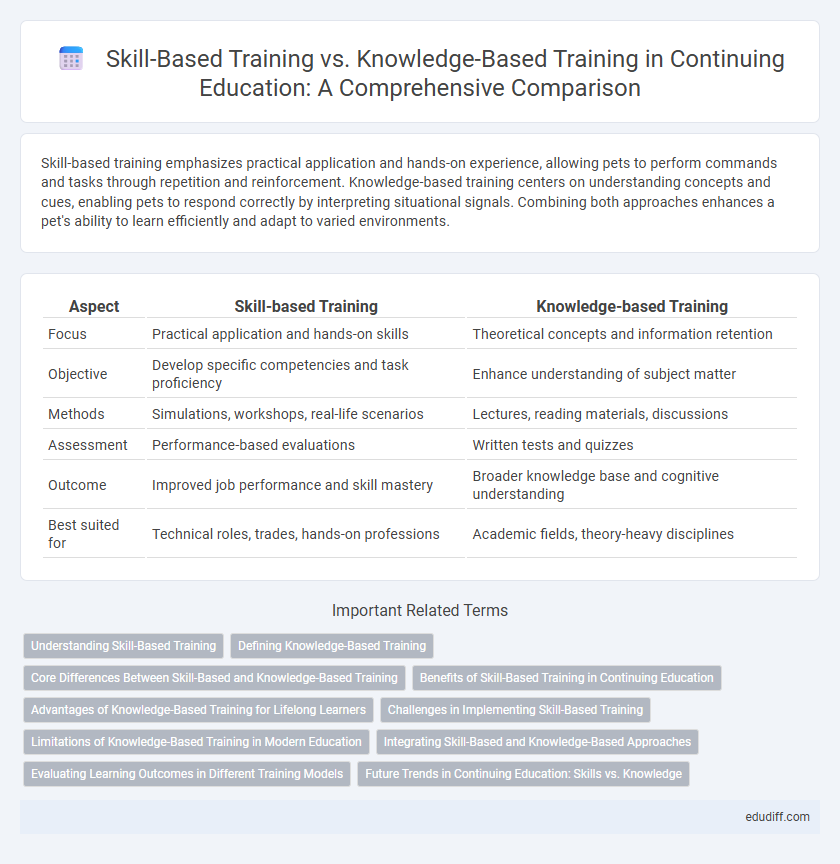Skill-based training emphasizes practical application and hands-on experience, allowing pets to perform commands and tasks through repetition and reinforcement. Knowledge-based training centers on understanding concepts and cues, enabling pets to respond correctly by interpreting situational signals. Combining both approaches enhances a pet's ability to learn efficiently and adapt to varied environments.
Table of Comparison
| Aspect | Skill-based Training | Knowledge-based Training |
|---|---|---|
| Focus | Practical application and hands-on skills | Theoretical concepts and information retention |
| Objective | Develop specific competencies and task proficiency | Enhance understanding of subject matter |
| Methods | Simulations, workshops, real-life scenarios | Lectures, reading materials, discussions |
| Assessment | Performance-based evaluations | Written tests and quizzes |
| Outcome | Improved job performance and skill mastery | Broader knowledge base and cognitive understanding |
| Best suited for | Technical roles, trades, hands-on professions | Academic fields, theory-heavy disciplines |
Understanding Skill-Based Training
Skill-based training emphasizes hands-on practice and real-world application to develop specific competencies necessary for job performance. It targets measurable abilities such as technical proficiency, problem-solving, and communication skills, enhancing employee productivity and efficiency. This approach often includes simulations, role-playing, and scenario-based exercises that reinforce practical skills over theoretical knowledge.
Defining Knowledge-Based Training
Knowledge-based training emphasizes the acquisition and retention of factual information, concepts, and theories essential for understanding a subject. It focuses on developing cognitive skills through structured learning materials, lectures, and assessments that test comprehension and recall. This type of training forms the foundation for informed decision-making and problem-solving by building a comprehensive knowledge base.
Core Differences Between Skill-Based and Knowledge-Based Training
Skill-based training centers on developing practical abilities and hands-on experience, enabling learners to perform specific tasks efficiently. Knowledge-based training emphasizes theoretical understanding and information retention, focusing on concepts and principles rather than application. The core difference lies in skill-based training prioritizing action-oriented learning, while knowledge-based training concentrates on cognitive comprehension.
Benefits of Skill-Based Training in Continuing Education
Skill-based training in continuing education enhances practical application and improves job performance by focusing on real-world tasks and hands-on experience. It promotes quicker adaptation to industry changes through experiential learning, leading to higher retention rates and immediate skill utilization. This approach bridges the gap between theoretical knowledge and workplace demands, boosting both individual productivity and organizational effectiveness.
Advantages of Knowledge-Based Training for Lifelong Learners
Knowledge-based training provides lifelong learners with a deep understanding of foundational concepts, enabling adaptability across various fields and the ability to acquire new skills efficiently. This form of training fosters critical thinking and problem-solving by emphasizing comprehension over rote memorization. As a result, learners develop a robust cognitive framework that supports continuous personal and professional growth.
Challenges in Implementing Skill-Based Training
Implementing skill-based training faces challenges such as the need for specialized instructors, high costs of practical equipment, and difficulties in measuring skill proficiency objectively. Organizations often struggle with developing standardized curricula that align with evolving industry demands while ensuring hands-on experiences are consistently effective. These obstacles can lead to resistance from stakeholders accustomed to traditional knowledge-based teaching methods.
Limitations of Knowledge-Based Training in Modern Education
Knowledge-based training often struggles to keep pace with rapidly evolving industries, leaving learners with outdated information that lacks practical applicability. Its emphasis on rote memorization and theoretical concepts can hinder the development of critical problem-solving and hands-on skills essential for real-world challenges. Modern education demands more dynamic approaches that integrate experiential learning and adaptability, areas where knowledge-based training frequently falls short.
Integrating Skill-Based and Knowledge-Based Approaches
Integrating skill-based and knowledge-based training approaches enhances overall competence by combining practical application with theoretical understanding. Skill-based training develops hands-on abilities and real-world problem-solving, while knowledge-based training ensures a solid foundation of concepts and principles. This holistic approach fosters deeper learning outcomes and better prepares individuals for complex tasks and adaptive challenges.
Evaluating Learning Outcomes in Different Training Models
Evaluating learning outcomes in skill-based training emphasizes measurable performance improvements and practical application, often quantified through simulations and hands-on assessments. In contrast, knowledge-based training assessment focuses on theoretical understanding and retention, typically measured by written tests or quizzes. Combining both models enhances overall competency by bridging conceptual knowledge with real-world skills, enabling comprehensive evaluation frameworks that capture diverse learner proficiencies.
Future Trends in Continuing Education: Skills vs. Knowledge
Future trends in continuing education emphasize a shift towards skill-based training to meet evolving workforce demands and technological advancements. Employers prioritize practical competencies such as digital literacy, problem-solving, and adaptability over traditional knowledge acquisition. Emerging educational platforms leverage adaptive learning technologies and micro-credentialing to deliver personalized skill development efficiently.
Skill-based Training vs Knowledge-based Training Infographic

 edudiff.com
edudiff.com